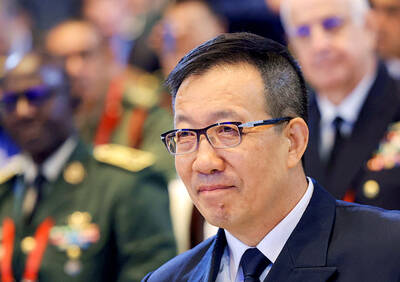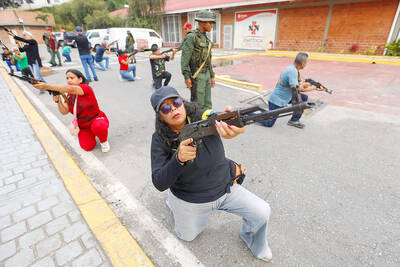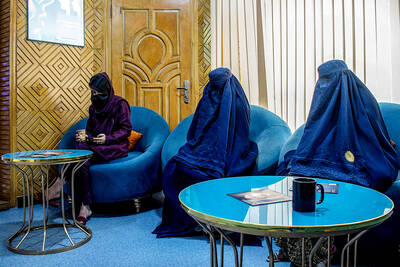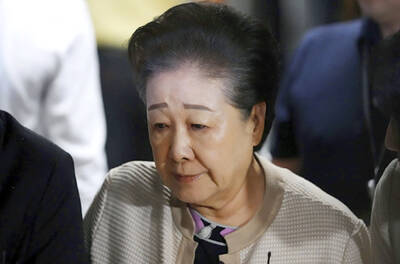Venezuela’s state-run CITGO oil company will continue providing cheap heating oil to US households, the Venezuelan Embassy said on Wednesday, two days after CITGO announced the program was suspended indefinitely.
“CITGO ... confirmed the continuation of its social programs in alignment with the solidarity principles endorsed by the government” of Venezuela, CITGO president Alejandro Granado was quoted as saying in an embassy statement. “Therefore, our flagship social program, the CITGO-Venezuela Heating Oil Program, will continue.”
Close to 200,000 needy households throughout the US have benefited from the Venezuelan program since 2005, said Citizens Energy, a US-based group that distributes the fuel at a discount.
Venezuelan President Hugo Chavez irked the administration of President George W. Bush when he announced the program in the midst of rising oil prices. Critics branded the offer as propaganda.
On Monday, Citizens Energy announced that the heating oil program had been suspended indefinitely because of CITGO’s need to reevaluate all its social programs because of falling oil prices and the global financial crisis. Citizens Energy spokesman Brian O’Connor said on Wednesday that the program had not stopped completely, but had been “suspended indefinitely.”
But he refused to say, when asked, whether any new decision on the program was pending.
Granado said the decision to continue the program “is the result of a strong commitment and a big effort on the part of CITGO and our shareholder, in light of the current global financial crisis and its impact on the oil industry in general.”
Since July, the price of oil has plummeted from US$130 a barrel to a little over US$27 a barrel, raising concerns in Venezuela, that derives 90 percent of its foreign currency revenues from oil. The government gets half of its funding from oil.
O’Connor said the Venezuelan oil subsidy program for the US last year amounted to US$100 million.
Citizens Energy president Joseph Kennedy II, also quoted in the embassy statement, said Chavez had decided to resume the heating oil program.
“This decision is a clear, direct message from President Chavez of his desire to strengthen relations between his country and the United States, particularly at this time, when a new US administration is scheduled to be sworn-in within the next few weeks,” Kennedy said.
US president-elect Barack Obama will be sworn in on Jan. 20.
Kennedy pointed out that he was “personally aware of President Chavez’s genuine concern for the most vulnerable, regardless of where they may live.”
When Citizens Energy first announced the suspension of Venezuela’s oil program, Kennedy said he was trying to make a personal appeal to Chavez, a staunch foe of the US government, to continue the oil deliveries.

BEIJING FORUM: ‘So-called freedom of navigation advocated by certain countries outside the region challenges the norms of international relations,’ the minister said Chinese Minister of National Defense Dong Jun (董軍) yesterday denounced “hegemonic logic and acts of bullying” during remarks at a Beijing forum that were full of thinly veiled references to the US. Organizers said that about 1,800 representatives from 100 countries, including political, military and academic leaders, were in Beijing for the Xiangshan Forum. The three-day event comes as China presents itself as a mediator of fraught global issues including the wars in Ukraine and Gaza. Addressing attendees at the opening ceremony, Dong warned of “new threats and challenges” now facing world peace. “While the themes of the times — peace and development —

Venezuela on Saturday organized a day of military training for civilians in response to the US deployment in the Caribbean, and amid new threats from US President Donald Trump. About a month ago, Washington deployed warships to international waters off Venezuela’s coast, backed by F-35 jets sent to Puerto Rico in what it calls an anti-drug and anti-terrorism operation. Venezuelan Minister of Defense Vladimir Padrino Lopez has accused Washington of waging “undeclared war” in the Caribbean, after US strikes killed over a dozen alleged drug traffickers off his country’s coast. Caracas also accused the US of seeking regime change, and

Decked out with fake crystal chandeliers and velvet sofas, cosmetic surgery clinics in Afghanistan’s capital are a world away from the austerity of Taliban rule, where Botox, lip filler and hair transplants reign. Despite the Taliban authorities’ strict theocratic rule, and prevailing conservatism and poverty in Afghanistan, the 20 or so clinics in Kabul have flourished since the end of decades of war in the country. Foreign doctors, especially from Turkey, travel to Kabul to train Afghans, who equally undertake internships in Istanbul, while equipment is imported from Asia or Europe. In the waiting rooms, the clientele is often well-off and includes men

BRIBERY ALLEGATIONS: A prosecutor said they considered the risk of Hak-ja Han tampering with evidence to be very high, which led them to seek the warrant South Korean prosecutors yesterday requested an arrest warrant for the leader of the Unification Church, Hak-ja Han, on allegations of bribery linked to the country’s former first lady and incitement to destroy evidence. The move came a day after the 82-year-old was questioned over her alleged role in bribing former first lady Kim Keon-hee and a lawmaker. Founded in 1954 by her late husband, Sun Myung Moon, the Unification Church has long been the subject of controversy and criticism, with its teachings centered on Moon’s role as the “second coming” and its mass weddings. Followers are derisively referred to as “Moonies.” However, the church’s